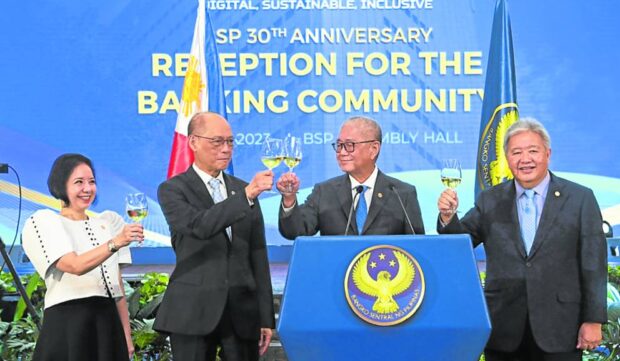
POWERFUL QUORUM Monetary Board members (from left) Anita Linda Aquino, Finance Secretary Benjamin Diokno, BSP Governor Eli Remolona Jr. and Bruce Tolentino toast to the BSP’s Pearl Anniversary; Three board seats are still vacant. —PHOTO FROM BSP
The weather in Manila was inclement last Friday evening, but that didn’t stop the top officials of the Philippine financial community from trekking to the assembly hall of the Bangko Sentral ng Pilipinas (BSP) to attend the central bank’s reception to celebrate its 30th anniversary.
As has become a tradition, the country’s top bankers, government officials and diplomatic corps troop twice a year (the other instance being the New Year’s reception) to the BSP’s headquarters along Roxas Boulevard to exchange views and press flesh with their peers and regulators.
But this time around, people came mainly to see and hear one man: the country’s new central bank chief, Governor Eli Remolona Jr.
Appointed just a few weeks ago by President Marcos to serve a six-year term as the chief regulator of the local banking system and the top man of the country’s financial system, Remolona has had a long and illustrious career in the international community, most notably with the Bank of International Settlements and the Federal Reserve Bank of New York.
GUARDS OF MONETARY STABILITY With some of his predecessors (from left): Benjamin Diokno, Amando Tetangco Jr. and Jose Cuisia Jr. —Doris Dumlao-Abadilla
But his over three decades of service of cumulative service in these two institutions means that he is a relatively unknown element for many Filipino bankers. As such, many came to gauge the man who would be at the helm of the country’s monetary policies for the better part of this decade.
Listening to Remolona on Friday evening, many bankers came away satisfied and relieved that the industry is in good and steady hands.
Interestingly, after the usual introductory pleasantries, Remolona recounted an interview he had with Bloomberg TV two weeks ago.
“Governor, when you’re not thinking about monetary policy, what do you think about?” Bloomberg’s Kathleen Hays asked.
“The right answer, of course, was, ‘When I’m not thinking about monetary policy, I think about my lovely wife,’” he recounts. “But being the central banking nerd that I am, I said instead, ‘When not thinking about monetary policy, I think about banking supervision and the payments system.’”
Thus, he launched into his views and plans for the country in terms of monetary policy, banking supervision and the payments system.
WOMEN LEADERS Landbank CEO Lynette Ortiz and BSP Deputy Governor Bernadette Romulo-Puyat —DORIS DUMLAO-ABADILLA
State of the macroeconomy
Speaking about the Philippines’ recovery from the pandemic, the BSP chief notes that the bounce-back was “surprisingly strong” and further describes it as “a recovery like no other.”
This is because the banking system remained robust throughout the public health crisis, maintaining more than adequate levels of capital and remaining flush with liquidity.
“This time, there was no need to repair balance sheets,” he says. “I have said this before, and I’ll say it again. Unlike in previous crises, this time our banks were part of the solution rather than part of the problem.”
At the same time, Remolona recognizes that the local economy continues to face signifiant challenges, especially in terms of the declining, but still-high, inflation rate.
“While still in the process of recovering from the pandemic, we were hit by an unusual confluence of supply shocks,” he says. “We were hit, for example, by a spike in global prices of fertilizer. This was due, of course, to the sanctions on shipping from Belarus and Russia. Our models were not calibrated for this kind of supply shock.”
“In response, we tightened monetary policy and we tightened aggressively, the way an inflation-targeting central bank would,” he adds. “We worried about expectations, and we worried about second-round effects.”
Because of this, inflation is on the downtrend toward the target range of 2 to 4 percent.
Eli Remolona Jr.—PHOTO FROMBSP
No room for complacency
“Nonetheless, it’s too soon to declare victory,” Remolona adds. “Core inflation remains high. There are still upside risks to inflation—for example, risks in the form of El Niño and further supply shocks. We will wait and see. We will analyze the data as they arrive, and that analysis will decide monetary policy down the road.”
Finally, the new central bank head detailed his third challenge as the country’s top financial system regulator: the payments system and BSP’s push to usher in a greater level of digitalization.
Since the governorship of the late Nestor Espenilla, the central bank has set a goal that at least 50 percent of all transactions in the country be executed digitally by this year. And it looks like that target will be hit, according to Remolona, noting that it currently stands at 42 percent from just 1 percent a decade ago.
“For the sake of efficiency, we seek the magic of digitalization,” he says. “We want this magic to also help with financial inclusion.”
“At this stage, we’ve given licenses to 258 digital payment providers,” he says. “Over time, we expect competition and network effects to result in a system where the most innovative, efficient and responsible providers truly respond to the needs of customers.”
Prior to hearing him speak in person, many bankers were impressed by the new Governor’s credentials, but were uncertain as to the policy directions he would take the central bank and the rest of the Philippine financial system.
But after hearing him last Friday, exchanging views with him and the BSP’s top brass, there is little doubt that many came away satisfied and reassured that the country’s economic and financial future are in safe hands.